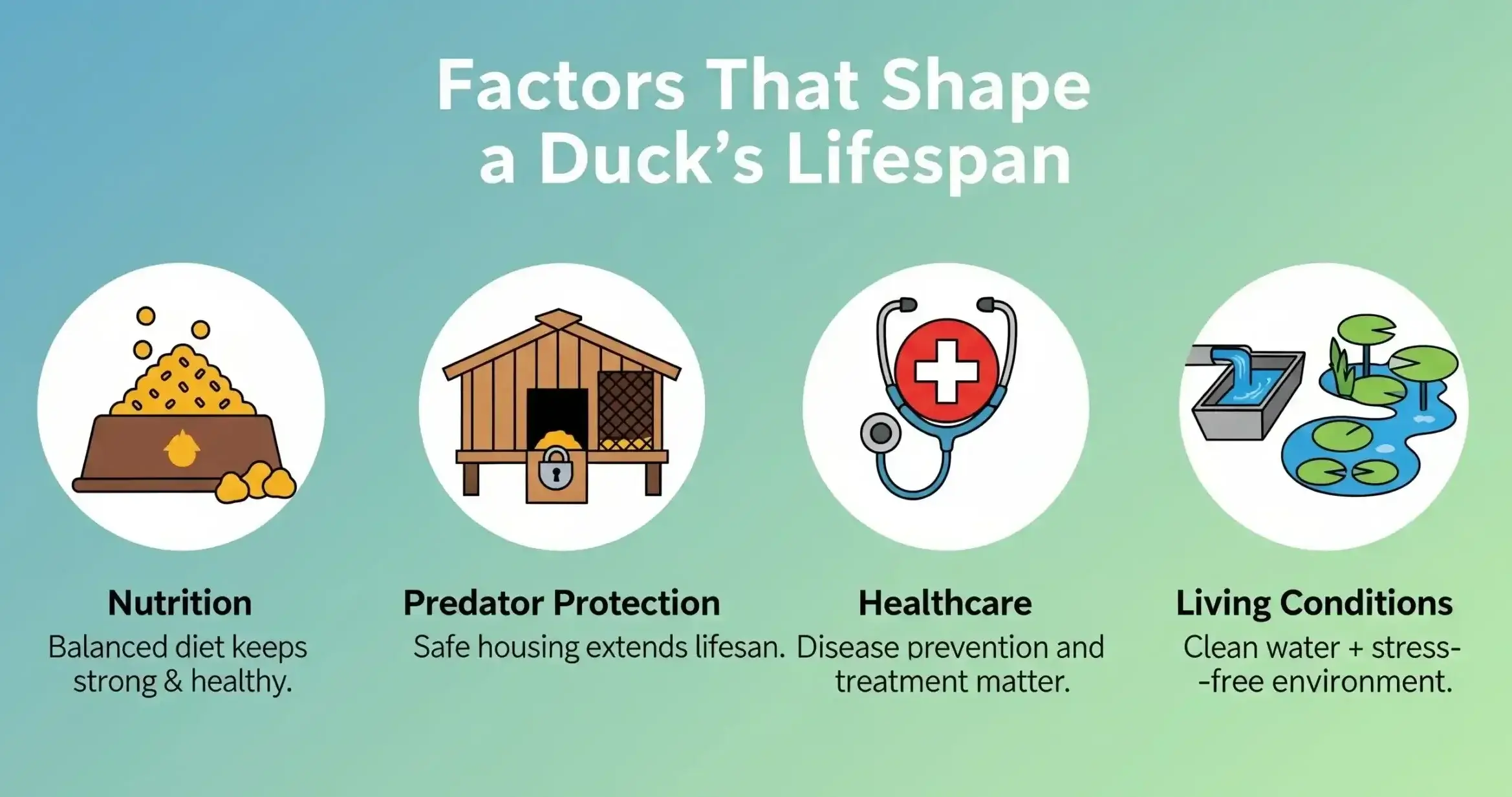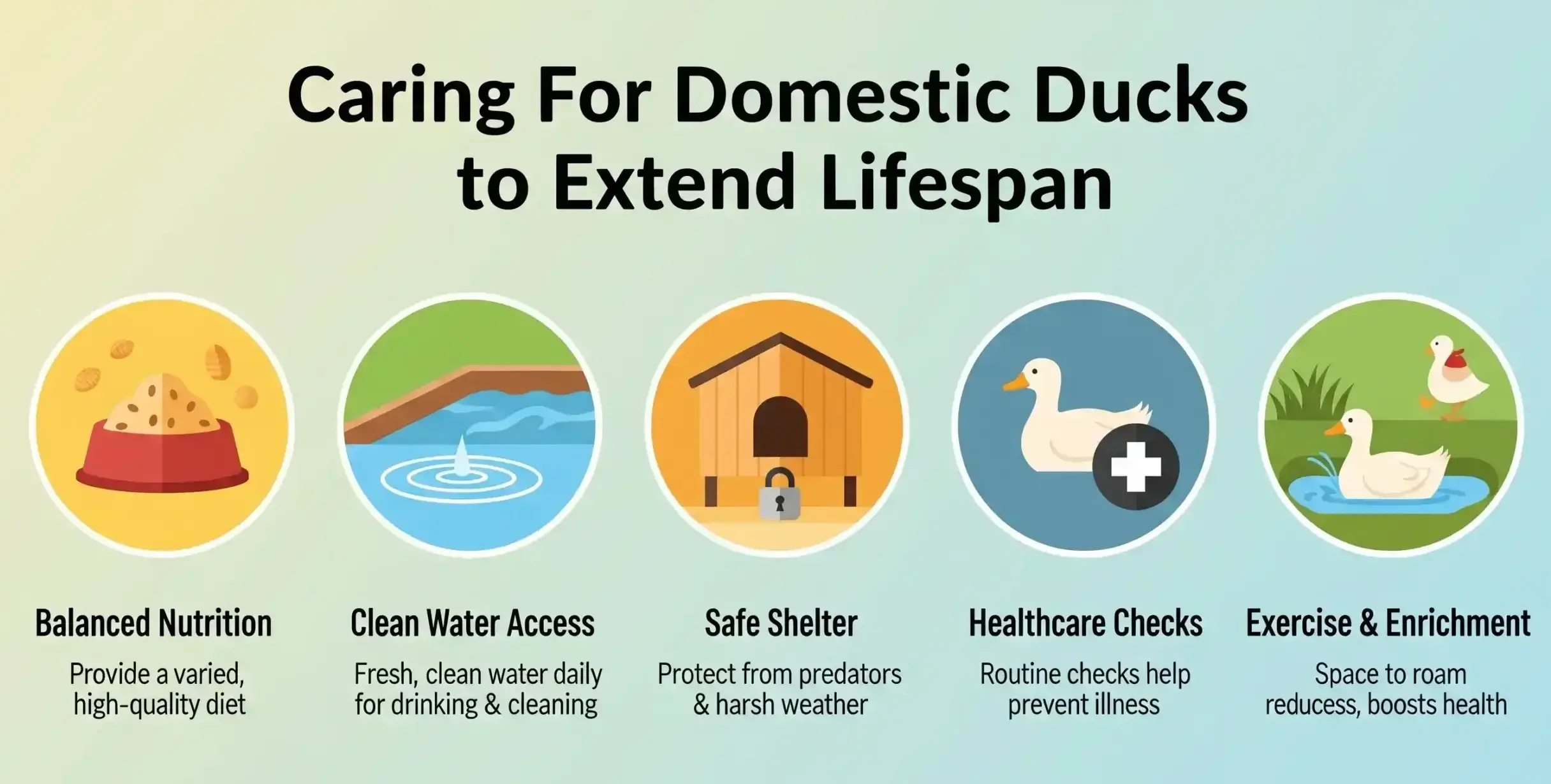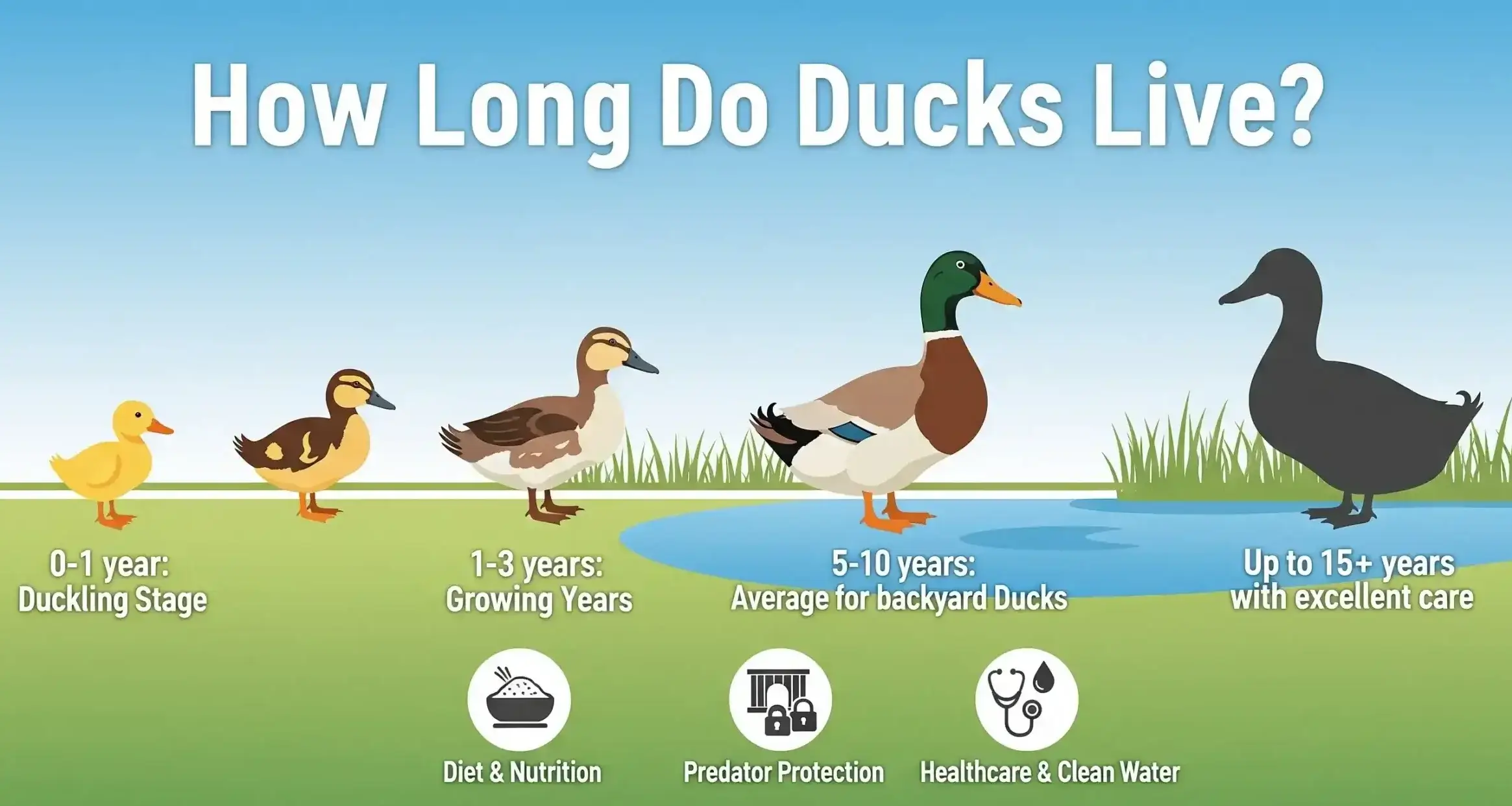When I first asked myself “how long do ducks live?”, I thought the answer would be simple. Turns out, there’s a whole world behind those webbed feet. Ducks aren’t just one-note birds. Their lifespan depends on where they live, the predators they face, and even what snacks they’re fed.
On average:
- Wild ducks: 3–10 years (if lucky against predators)
- Domestic ducks: 8–15 years (with good care)
- Record-setters: Over 20 years (yes, really—one Muscovy in South Africa made the Guinness records).
Let’s waddle through the details.
Average Duck Lifespan: Wild vs. Domestic
Wild Ducks and the Tough Fight for Survival
Life in the wild isn’t easy. Mallards, pintails, garganeys, and gadwalls face foxes, hawks, snakes, and otters daily. Fewer than half of ducklings even make it to adulthood, with heavy predation and harsh winters knocking survival rates down fast. A wood duck, for example, might reach 4 years in the wild if it dodges crows and turtles along the way.
Domestic Ducks as Pets or Livestock
Domestic breeds like Pekin, Cayuga, and Indian Runner live longer because we help shield them from predators. With proper housing, nutrition, and veterinary care, domestic ducks often reach 10–12 years, sometimes beyond 15.
Record-Breaking Longest-Lived Ducks
The Guinness World Records highlight ducks like Ernie the Desi, a domestic bird that pushed past two decades. Genetics, environment, and a healthy dose of luck all help.
Factors That Shape a Duck’s Lifespan

Species and Breed Differences
- Muscovy ducks: 12–20 years in safe care (largest and slowest-aging)
- Pekin ducks: 8–12 years (but meat-farmed individuals live far shorter)
- Bantam & Call ducks: Often 7–9 years
- Mallards: 5–10 years in nature, longer in shelter
Habitat and Landscapes
Ducks thrive in ponds, lakes, wetlands, rivers, and marshes. Urban parks and backyards add new risks: litter, sewage, and plastic can cause disease or shortened lives.
Predators
Foxes, mink, stoats, hawks, bass, turtles, and even crows all see ducklings as lunch. Secure fencing and covered enclosures protect domestic ducks, especially at night.
Climate
Cold winters test their fat reserves and energy. Without access to shelter and food, many wild flocks in the Northern Hemisphere simply don’t survive. Domestic birds need frost-proof housing to avoid frostbite on legs and feet.
Disease & Parasites
Viruses like avian flu, duck virus hepatitis, and enteritis, along with parasites (mites, worms), kill millions worldwide each year. Vaccines, flubendazole treatments, and hygiene keep pet ducks much safer.
Food & Nutrition
Like us, ducks live longer with proper diets. Balanced feed, greens (spinach, peas, carrots), and calcium-rich supplements for strong eggshells are essential. Overfeeding bread to park ducks? That shortens years drastically.
The Duck Life Cycle Explained
Eggs, Incubation, and Hatching Days
Females lay a clutch of 8–12 eggs, incubating them for about 26–28 days. The yolk sack feeds embryos until hatching. Brooding mothers fiercely guard nests in straw, leaves, or hay.
Ducklings and Survival
Adorable fluff-balls, but highly vulnerable. Less than half make it to fledgling stage in the wild due to predation. Clean pools, warmth, and supervision boost survival rates at home.
Juveniles, Molting, and First Flights
Around 6–8 weeks, juveniles grow feathers for flight. Molting cycles reshape plumage each year, costing high energy. Extra protein keeps them strong during these transitions.
Reproduction and Adulthood
By around one year, ducks reach sexual maturity. Female ducks may produce multiple broods across seasons, though overbreeding in domestic flocks can shorten female lifespans.
Caring For Domestic Ducks to Extend Lifespan

Safe Housing and Protection
Predator-proof fencing, secure enclosures, and insulated coops keep ducks alive. Each adult duck needs at least 4–6 square feet indoors and 15+ outdoors to roam.
Clean Water and Space
Pools, tubs, or ponds let ducks splash, bathe, and preen feathers. Clean water prevents feather parasites and keeps tail feathers waterproof.
Nutrition
- Proteins: Mazuri waterfowl feed, peas, mealworms
- Greens & Veggies: lettuce, squash, pumpkins, carrots
- Supplements: calcium and vitamins improve egg laying and health
Veterinary Care
Routine health checks, vaccinations, and quick treatment of worms or respiratory disease (very common in confined barns) are lifesavers.
Lifestyle Needs
Ducks form bonds, grieve when mates die, and thrive in groups. Keeping them calm, social, and stress-free translates directly to longer lifespans.
Conservation and Wild Duck Survival
Habitat Protection
Wetlands, reserves, and coastal habitats protect birds from construction and agriculture damage.
Threats From Humans
Pollution, plastic, climate-induced droughts, and loss of marshes decline natural lifespans.
Hunting & Quotas
Regulated harvest ensures populations stay stable. Overhunting remains a historical reason wild lifespans shortened.
Rehabilitation & Education
Wildlife hospitals and centers save thousands of injured ducks yearly. Community awareness and school education programs keep conservation alive.
Conclusion
So, how long do ducks live? The answer depends on a delicate balance of species, predators, food, and protection. Wild ducks may only see a few winters, while domestic ducks, with good housing, nutrition, and care, can live over a decade or more.
To me, ducks reflect the wider story of survival and adaptability in nature. Whether a mallard crossing a city park pond or a Muscovy waddling around a farm, each life deserves care and respect. And the more we learn, the longer we help these web-footed friends thrive.
FAQs
How long do ducks live as pets?
Most domestic ducks, like Pekin or Cayuga, live 8–12 years if cared for properly.
What is the oldest duck on record?
The Guinness record belongs to a South African Muscovy that lived past 20 years.
Do female ducks live longer than males?
Not usually—though females often face higher stress during egg-laying seasons.
How many years do mallards usually survive in the wild?
Around 5 years on average, though many perish younger.
Can ducks survive winter without shelter?
In the wild, yes—though many die in harsh northern winters. Domestic ducks always need frost-proof shelters.
Do male or female ducks live longer?
Generally, there isn’t a significant difference in lifespan between female and male ducks. However, females can face increased risks during the breeding season due to the energy demands of egg laying and brooding.
Can ducks be indoor pets?
While some people keep ducks indoor, they are naturally messy and need a lot of space to roam, explore, splash, and bathe. It’s challenging to provide an optimal environment indoor, and they thrive better with access to the outdoors, even a small pool or pond.
What common diseases shorten a duck’s life?
Ducks can be affected by viruses like avian flu and duck viral enteritis, as well as bacterial infections such as cholera and colibacillosis. Proper husbandry, clean water, and good nutrition are key to prevention.
How can I protect my ducks from predators?
A secure enclosure with sturdy fencings, especially during bedtime and night-time roosting, is crucial. Consider electric netting or a secure coop with a roof to deter both ground mammals and aerial hawks. Always supervise your ducks when they are outside.
Sources & References
- https://www.audubon.org
- https://www.ducks.org
- https://www.ncbi.nlm.nih.gov
- https://www.rspb.org.uk
- https://www.guinessworldrecords.com
- https://www.sciencedirect.com


